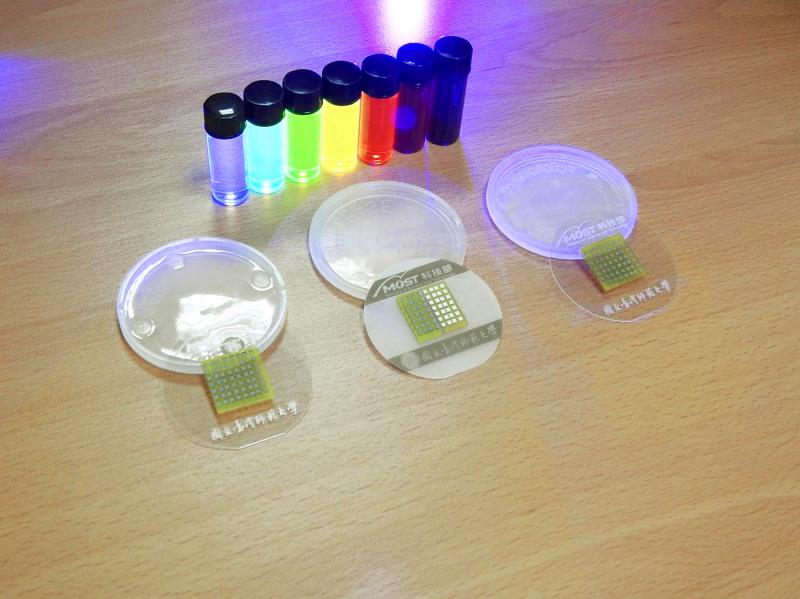A team of Taiwanese researchers yesterday said they had collaborated with Japanese researchers to develop a new memory device that can transmit both electronic and light signals.
The team comprised researchers from National Taiwan Normal University (NTNU), National Taiwan University and Japan’s Kyushu University, NTNU professor of electro-optical engineering Lee Ya-ju (李亞儒) told a news conference in Taipei.
Many researchers are seeking to produce next-generation memory devices to replace the widely used flash memory and while resistive random access memory (RRAM) is considered an alternative, its operational speed has some room for improvement, Lee said.

Photo courtesy of the Ministry of Science and Technology
Semiconductor researchers have combined RRAM and light-emitting diodes to develop light-emitting memory devices, but the fabrication process is more complicated due to the need to integrate various materials, he said.
To overcome the problem, Lee said his team turned to cesium lead bromide to develop perovskite quantum dots for a memory device.
Perovskite is a natural mineral that can be chemically synthesized and has been widely used in semiconductor manufacturing.
Using cesium lead bromide is one of the ways to synthesize perovskite, but some toxicity of lead has to be tolerated for the material to be stable, Lee said.
The team also used silver to make the device’s electrodes, he added.
When they applied different voltages to the device, the varieties of ions in the device changed, allowing it to store and read data electronically or optically, Lee said.
Through perovskite quantum dots of different sizes, the device emits different colors to indicate whether it is reading ones or zeros, he said.
The team’s findings were published in the journal Nature Communications in July.
The team’s technique might change the future of consumer electronics, given light transmits data faster than electronics, NTNU College of Technology and Engineering dean Kao Wen-chung (高文忠) said.
The research has expanded the use of perovskite and set a new example for the integration of electronics and photonics, said the Ministry of Science and Technology, which funded the project.

Taipei, New Taipei City, Keelung and Taoyuan would issue a decision at 8pm on whether to cancel work and school tomorrow due to forecasted heavy rain, Keelung Mayor Hsieh Kuo-liang (謝國樑) said today. Hsieh told reporters that absent some pressing reason, the four northern cities would announce the decision jointly at 8pm. Keelung is expected to receive between 300mm and 490mm of rain in the period from 2pm today through 2pm tomorrow, Central Weather Administration data showed. Keelung City Government regulations stipulate that school and work can be canceled if rain totals in mountainous or low-elevation areas are forecast to exceed 350mm in

EVA Airways president Sun Chia-ming (孫嘉明) and other senior executives yesterday bowed in apology over the death of a flight attendant, saying the company has begun improving its health-reporting, review and work coordination mechanisms. “We promise to handle this matter with the utmost responsibility to ensure safer and healthier working conditions for all EVA Air employees,” Sun said. The flight attendant, a woman surnamed Sun (孫), died on Friday last week of undisclosed causes shortly after returning from a work assignment in Milan, Italy, the airline said. Chinese-language media reported that the woman fell ill working on a Taipei-to-Milan flight on Sept. 22

COUNTERMEASURE: Taiwan was to implement controls for 47 tech products bound for South Africa after the latter downgraded and renamed Taipei’s ‘de facto’ offices The Ministry of Foreign Affairs is still reviewing a new agreement proposed by the South African government last month to regulate the status of reciprocal representative offices, Minister of Foreign Affairs Lin Chia-lung (林佳龍) said yesterday. Asked about the latest developments in a year-long controversy over Taiwan’s de facto representative office in South Africa, Lin during a legislative session said that the ministry was consulting with legal experts on the proposed new agreement. While the new proposal offers Taiwan greater flexibility, the ministry does not find it acceptable, Lin said without elaborating. The ministry is still open to resuming retaliatory measures against South

1.4nm WAFERS: While TSMC is gearing up to expand its overseas production, it would also continue to invest in Taiwan, company chairman and CEO C.C. Wei said Taiwan Semiconductor Manufacturing Co (TSMC) has applied for permission to construct a new plant in the Central Taiwan Science Park (中部科學園區), which it would use for the production of new high-speed wafers, the National Science and Technology Council said yesterday. The council, which supervises three major science parks in Taiwan, confirmed that the Central Taiwan Science Park Bureau had received an application on Friday from TSMC, the world’s largest contract chipmaker, to commence work on the new A14 fab. A14 technology, a 1.4 nanometer (nm) process, is designed to drive artificial intelligence transformation by enabling faster computing and greater power